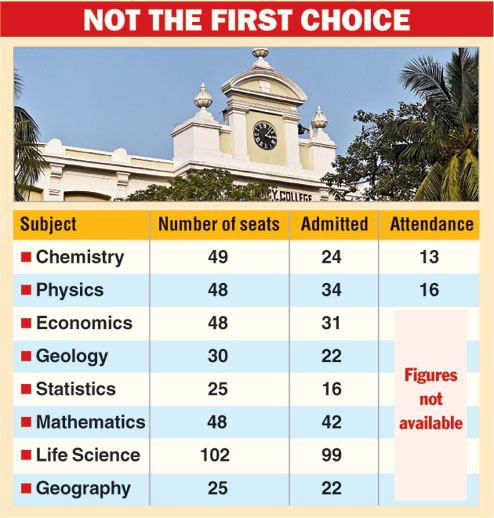
Sept. 14: Presidency University has been unable to find students to fill its undergraduate seats in science for the second consecutive year, an unthinkable situation to be in for the 200-year-old institute in its earlier avatar as a college.
The chemistry department has 49 seats, but only 24 students have taken admission. Just over half of these new entrants have attended classes over the past two weeks.
The physics department has 48 seats, of which 34 have been filled. Only 16 of these students have attended classes since the new academic session began.
In economics, 17 out of 48 seats did not find takers. Geology has 30 seats, of which eight have not been filled. The statistics department did not find deserving candidates for nine seats out of 25.
The number of vacant seats in science alone is more than double of what Presidency had reported last year, setting off alarm bells in an institute that aspires to be the first choice of the brightest students.
Many students who had qualified for admission to study physics or chemistry did not take the seats because they saw better opportunities in institutes like IISER-Pune and Jadavpur University.
The father of a student from Durgapur said IISER-Pune appeared the more suitable institute given his son's choice of career. "He wants to focus on research. I preferred IISER over Presidency because it has better infrastructure," he said.
A girl from Cooch Behar opted out of Presidency after taking admission to study chemistry there. She chose Jadavpur University. "My daughter had consulted her seniors and they advised her to go to Jadavpur University, saying the faculty and the laboratories were better than at Presidency," her father said.
Presidency, of course, ceased to be the college of choice for students in Calcutta long ago. The trend of students from the districts seeking better alternatives has deepened the gloom. The readiness of students to travel beyond Bengal for higher studies has been a factor in Presidency's decline. "Studying in a top Calcutta college used to be ultimate dream for a student from the districts. Not anymore," said a teacher who did not want to be identified.
When admissions closed last year, Presidency had 23 seats vacant across departments, including science and arts. This year the figure reported by the chemistry department alone has surpassed that.
In 2016, vice-chancellor Anuradha Lohia had blamed it on delayed admissions. The entrance tests this year were advanced to late April and early May, leading to a surge in the number of potential candidates. The admission scenario changed after the third and last round of counselling in late August.
"Why so many seats should remain vacant at this premier university (Presidency)?" education minister Partha Chatterjee had said last December.
One of the reasons - and a touchy topic - is Presidency lacking big names in its faculty. "Students these days are smarter in finding out which institute has better options to offer," said Anup Sinha, former professor of economics at IIM Calcutta and a Presidency alumnus. "Even when they are in school, students gather information about which institute has the best faculty and infrastructure. You can have swank classrooms, but you must have bright teachers occupying those classrooms."
Not that Presidency has been unable to hire faculty. It has failed to retain the big names, though.
Sinha cited the departure of Ambar Nath Ghosh, who resigned as the head of Presidency's economics department in September 2014 to return to Jadavpur University, from where he had shifted barely nine months earlier.
A former professor in the physics department said institutes like IISER-Kalyani have a much bigger reputation. "Being a state university, Presidency cannot match IISER. But it should not have had so many vacant seats across science departments," he said.
The talking point among many academicians is why Presidency has failed to leverage its upgrade from a college to a university "to attract talent", as suggested by US-based physicist Sankar Das Sarma during a 2013 visit.
"Now that it has become a university...I would suggest to somehow use the advantage of calling yourself a university to attract talent," he had said December 15, 2013.
Asked about Presidency not finding enough deserving students to fill its classrooms, vice-chancellor Lohia asked this reporter to speak to registrar Debajyoti Konar.
Konar said only the dean of science, Arabinda Nayak, could speak on the subject. Nayak declined to comment.











